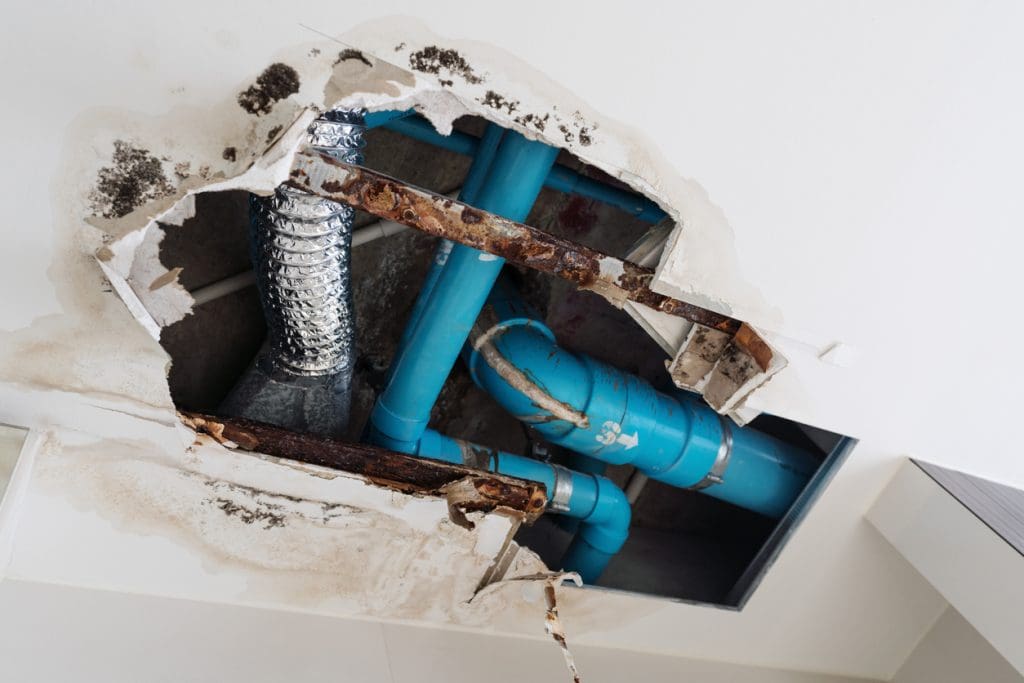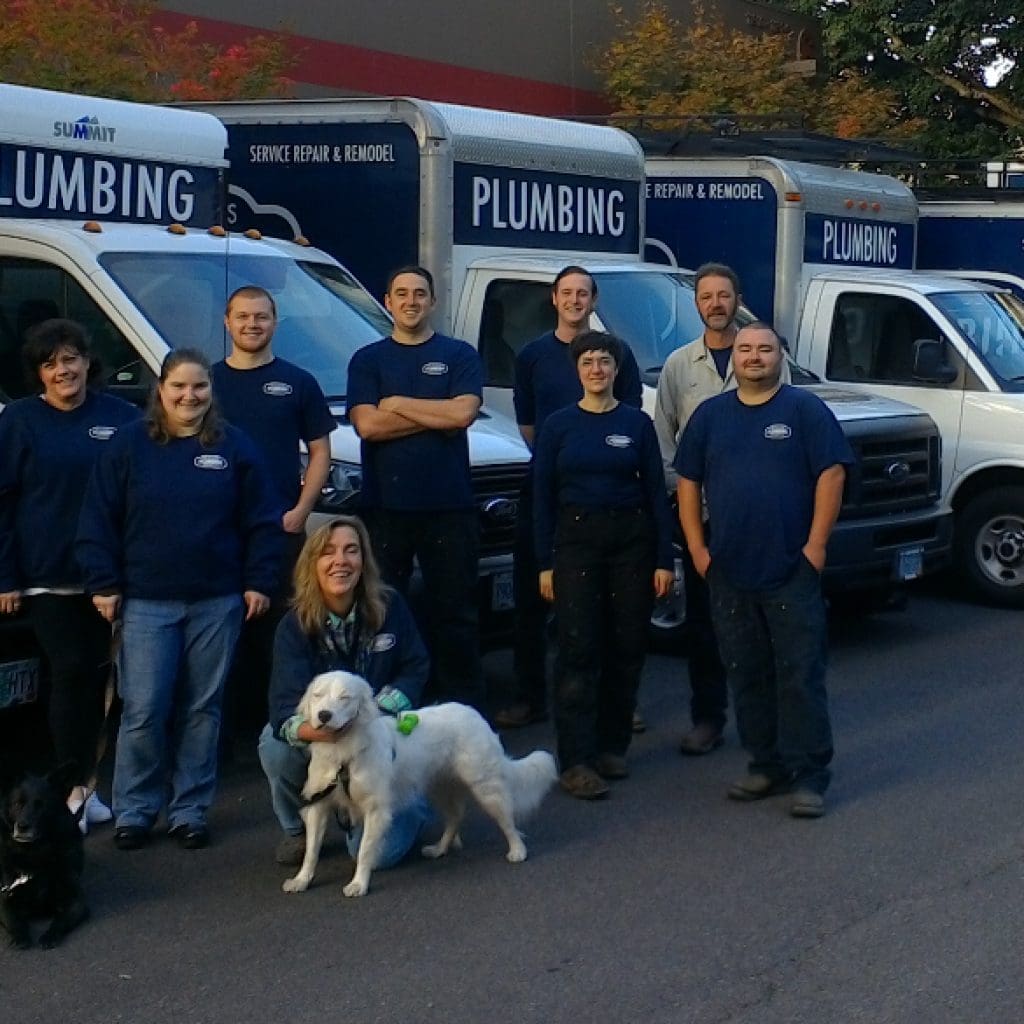(Updated November 2025) – Mold is one of those home issues that hides quietly until it becomes a big problem. It can start as faint black spotting around a baseboard or a musty smell under the sink, and before long, it’s affecting air quality and even your health. Plumbing leaks and mold go hand in hand, unless you can fix the problem sooner rather than later.
Here in Portland, OR, where the climate is naturally damp and cool several months out of the year, homes are especially vulnerable to mold growth. Plumbing leaks, condensation, and slow drips often play a bigger role than homeowners realize. We’ve seen how small moisture problems can lead to major mold damage and how simple, timely plumbing repairs can prevent it altogether.
How Do Plumbing Leaks Cause Mold Growth?
 Plumbing leaks are one of the most common hidden causes of mold in homes. Even a minor drip inside a wall or under a cabinet can create the perfect environment for mold to thrive: dark, damp, and undisturbed.
Plumbing leaks are one of the most common hidden causes of mold in homes. Even a minor drip inside a wall or under a cabinet can create the perfect environment for mold to thrive: dark, damp, and undisturbed.
When water leaks from pipes, it seeps into materials like drywall, insulation, and wood. These porous surfaces hold moisture, allowing mold spores (which are always present in the air) to grow and spread. Over time, this can lead to structural damage, poor indoor air quality, and health issues like allergies or respiratory irritation.
In many Portland homes, leaks from older or corroded pipes go unnoticed for weeks or even months. That’s why regular plumbing inspections and prompt repairs are essential, especially in older homes where fittings may have loosened or materials are nearing the end of their lifespan.
What Are the First Signs of Mold from Plumbing Problems?
Early detection is key to stopping mold before it spreads. Watch for these subtle indicators that may point to plumbing leaks or moisture buildup:
- Persistent musty odors near sinks, basements, or behind walls.
- Discoloration or bubbling paint on ceilings or drywall.
- Soft or warped flooring, especially near bathrooms or laundry areas.
- Increased humidity or condensation around pipes, windows, or vents.
If you see or smell signs like these, it’s worth calling a professional plumber to check for hidden leaks. Even if you don’t see visible water, moisture behind the walls can feed mold long before it becomes noticeable.
Can Condensation on Pipes Cause Mold?
Absolutely. In Portland’s cool, damp climate, condensation is a year-round concern, particularly in basements, crawl spaces, and bathrooms. When warm indoor air meets a cold pipe, the moisture in that air condenses and collects on the surface.
If those pipes run through enclosed spaces without ventilation, the condensation can drip onto wood framing, insulation, or drywall, creating the same conditions as a leak. Over time, this leads to mold growth, staining, and unpleasant smells.
The solution is simple but effective: wrapping cold water pipes in insulating foam sleeves helps prevent condensation from forming in the first place. This small preventive step can save thousands of dollars in future repairs and is one of the most cost-effective forms of mold prevention available.
How to Stop Mold from Forming Around Pipes
The best way to stop mold growth is to remove its source of moisture. For plumbing-related mold, that means repairing leaks quickly, improving drainage, and controlling condensation.
A few key steps include:
- Inspecting pipes regularly: Check under sinks, behind washing machines, and around water heaters. Look for rust, corrosion, or small drips that could indicate a leak.
- Repairing leaks promptly: Even a small drip can lead to significant mold growth if left unchecked. Meticulous Plumbing can locate and fix leaks quickly using modern diagnostic tools.
- Improving ventilation: Bathrooms, laundry rooms, and kitchens should have working exhaust fans to help manage humidity around plumbing.
- Upgrading older plumbing materials: Replacing corroded galvanized or copper pipes with durable PEX helps prevent future leaks and condensation issues.
These preventive measures not only protect your home from mold but also improve your plumbing system’s overall performance and lifespan.
When Should You Call a Plumber for Mold Prevention?
 Many homeowners call a plumber only after mold has appeared, but calling before it starts is even better. If your home has ongoing moisture issues, visible condensation, or signs of minor leaks, it’s worth scheduling a professional inspection.
Many homeowners call a plumber only after mold has appeared, but calling before it starts is even better. If your home has ongoing moisture issues, visible condensation, or signs of minor leaks, it’s worth scheduling a professional inspection.
Meticulous Plumbing offers comprehensive leak detection and whole-house plumbing inspections to identify risks early. We don’t just fix leaks, we help prevent future ones by assessing pipe conditions, reviewing water pressure, and recommending long-term solutions.
In Portland, where the combination of rain, humidity, and older housing stock makes moisture control a constant challenge, a proactive approach is the best form of mold prevention.
Understanding the Health and Home Impact of Mold
Mold isn’t just a cosmetic concern. It can trigger allergic reactions, worsen asthma, and create long-term indoor air quality problems. Prolonged exposure to mold from plumbing leaks can also damage framing, flooring, and drywall, leading to costly repairs that could have been avoided with timely plumbing maintenance.
If you or your family notice persistent coughs, headaches, or allergy symptoms that seem worse at home, hidden mold may be part of the problem. Fixing plumbing leaks and improving moisture control can go a long way toward making your living environment healthier and more comfortable.
Plumbing Leaks and Mold Frequently Asked Questions
Can plumbing leaks really cause black mold?
Yes. Hidden leaks behind walls or under floors often create perfect conditions for black mold to grow undetected.
Is mold from plumbing leaks covered by insurance?
It depends on your policy. Many insurers cover sudden or accidental leaks but not slow, ongoing issues. Prompt detection is key.
How can I tell if condensation or a leak is causing mold?
Condensation usually forms on the outside of pipes, while leaks drip from joints or fittings. A plumber can confirm the source using moisture sensors or infrared tools.
Should I replace old pipes to prevent mold?
If your home has aging or corroded pipes, replacement may prevent future leaks and moisture problems. Materials like PEX are less prone to condensation and corrosion.
How often should I have my plumbing inspected?
We recommend a professional inspection every two to three years — more often in older Portland homes or if you’ve noticed moisture issues.
Fix Plumbing Leaks Before Mold Has a Chance to Grow
Plumbing leaks and condensation may seem minor, but in Portland’s damp environment, they can quickly lead to mold growth and property damage. Meticulous Plumbing helps homeowners identify and stop leaks before they spread, thereby protecting your home, health, and peace of mind.
Call today to schedule a plumbing inspection or leak repair in Portland, OR, and keep your home dry, healthy, and mold-free the Meticulous way.


